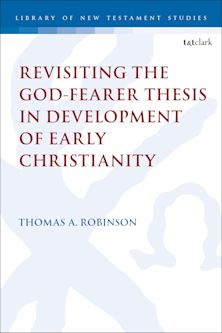- Home
- ACADEMIC
- Religious Studies
- Judaism
- Modern Spain and the Sephardim
Modern Spain and the Sephardim
Legitimizing Identities
Modern Spain and the Sephardim
Legitimizing Identities
You must sign in to add this item to your wishlist. Please sign in or create an account
Description
Modern Spain and the Sephardim: Legitimizing Identities addresses the legal, political, symbolic, and conceptual consequences of the development of a new framework of relations between the Spanish state and the descendants of the Jews expelled from the Iberian kingdoms in 1492 from its beginnings in the nineteenth century to its unexpected consequences during World War II. This book aims to understand and explain the unchallenged idea of the Sephardim as a mix of Spaniard and Jew that emerged in Spain in the second half of the nineteenth century. Maite Ojeda-Mata examines the processes that led to this ambivalent conceptualization of Sephardic identity, as both Spanish and Jewish, and its consequences for the Sephardic Jews.
Table of Contents
1. The Legacy of Modernity for the Jews in Spain
2. The Sephardim and Spanish Colonialism in Morocco and the Eastern Mediterranean
3. Sephardic Jews in Spain
4. The Management of Socio-Religious Differences
5. Persecution and Expulsion during the Early Years of the Franco Dictatorship
6. Spain and the Sephardim during World War II
7. Epilogue: The 2015 Law Granting Spanish Citizenship to Sephardic Jews of “Spanish Origin”
Conclusion
Product details
| Published | 20 Dec 2017 |
|---|---|
| Format | Ebook (Epub & Mobi) |
| Edition | 1st |
| Extent | 285 |
| ISBN | 9781498551755 |
| Imprint | Lexington Books |
| Illustrations | 6 Tables |
| Series | Bloomsbury Studies in Modern Jewish History, Historiography, and Memory |
| Publisher | Bloomsbury Publishing |
About the contributors
Reviews
-
This publication contributes greatly to the breadth of contemporary Sephardic scholarship by dedicating several chapters to relatively unknown subjects, such as the Jewish community in Barcelona and the treatment of Sephardic Freemasons in Spain. . . . The nuanced manner with which Ojeda-Mata treats the complicated subject of Spanish relations with the Sephardim within its borders, in the protectorate, and in Europe is valuable for the future of Sephardic studies. . . Her sources are impeccably cited and amply explained in extensive notes at the end of each chapter and a long bibliography. The strength of this volume is the concrete nature of all of the data, which often comes directly from primary sources. Ojeda-Mata does not generalize the intricacies of the often-convoluted relationships between Spain and Sephardic Jews. Modern Spain and the Sephardim is sure to become a touchstone in Sephardic studies for years to come.
H-Net: Humanities and Social Science Reviews Online
-
Spain’s complex, convoluted and tragic relationship with Jews is the theme of Maite Ojeda-Mata’s comprehensive and nuanced work.
The Times of Israel
-
Starting from two small and local cultural spaces, the Sant Antoni market in Barcelona and the Jewish community of Melilla, this anthropological study takes its readers on a journey that has its origins in the expulsion of Jews from Spain in 1492. What might appear as a story long past, turns out to be of the highest relevance for a discussion of contemporary Spanish and European identities. The book discusses the relationship between Spain and the Sephardic Jewish diaspora since the nineteenth century, including the attitude of the Franco regime during World War II, and reaches out to the present day when Spain—hesitatingly—offers citizenship to Jews of Spanish origin. Based on thorough archival research both in Spain and its former colony Morocco, Maite Ojeda-Mata’s work offers an innovative insight into the important role of Jewish/non-Jewish relations for the development of European memory and identity.
Joachim Schlör, University of Southampton
-
Jewish, Spanish, or both? Ojeda-Mata reveals the ambivalent images of the Sephardim and its political consequences in contemporary Spain, challenging dominant ideas about identity in a very well documented piece of historical anthropology.
Josep Lluís Mateo Dieste, Universitat Autònoma de Barcelona
-
An in-depth, well-documented, and well-argued work of critical research that challenges the poor and uncritical accounts on the idea of Sephardic identity in modern Spain. It is packed with a lot of data and information from several archival and ethnographic sources, which are carefully analyzed and critically interpreted. It is essential reading that is already a classic in the field.
Eloy Martin Corrales, Universitat Pompeu Fabra
-
A fascinating and superb book of obvious interest not only to scholars interested in Jewish studies but also to those who study the construction of the social and political categories of ‘Jewish,’ ‘Sefardi,’ ‘race,’ and ‘nation’ from a historical and anthropological perspective.
Alexandre Coello de la Rosa, Universitat Pompeu Fabra

ONLINE RESOURCES
Bloomsbury Collections
This book is available on Bloomsbury Collections where your library has access.



































